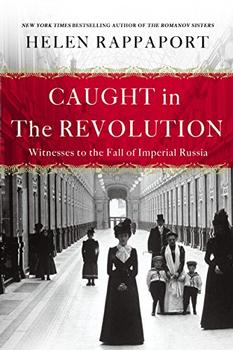Summary | Excerpt | Reviews | Beyond the Book | Readalikes | Genres & Themes | Author Bio

Petrograd, Russia, 1917 - A World on the Edge
by Helen Rappaport
Lord Milner had also confided that he thought the trip a waste of time, having realised 'the inefficiency of the Russians' at getting anything done, and had decided that Russia was doomed – at home, and at the front. It was, however, 'the general consensus of informed opinion, both Allied and Russian', that 'there will be no revolution until after the war' Maurice Paléologue, though, saw it differently. As the French delegates prepared to return home, he gave them a message to take to the President in Paris: 'A revolution crisis is at hand in Russia … Every day the Russian nation is more indifferent towards the war and the spirit of anarchy is spreading among all classes and even in the army. 'The October strikes in the Vyborg Side had, in Paléologue's view, been 'very significant'; for when violence had broken out between strikers and the police, the 181st Regiment – called on to assist the police – had actually turned on them. A division of Cossacks had had to be 'hastily called in to bring the mutineers to their senses'. If there were to be an uprising, Paléologue warned, 'the authorities cannot count on the army'. And he went even further: the Allies must also quietly prepare for the likely 'defection of our ally' – out of the war and, with it, its role in the defence of the Eastern Front. Sir George Buchanan was now so consumed by a mounting sense of imminent disaster that he reported to the British Foreign Office in London that 'Russia will not, in my opinion, be able to face a fourth winter campaign if the present situation is indefinitely prolonged.' Trouble, 'if it comes, will be due to economic rather than political causes'. And it would begin 'not with the workmen in the factories, but with the crowds waiting in the cold and the snow outside the provision shops'.
By February the daily consignment of flour to Petrograd had dropped to just twenty-one wagonloads, instead of the normal 120 needed. What white bread there was 'had become greyer and greyer until it was uneatable', due to excessive adulteration. Official mismanagement, corruption and wastage of supplies were prodigious, made worse by a crippled rail network that was unable to transport food efficiently from the provinces – where it was still plentiful – to the cities that most needed it. People were incensed to discover that, due to the hikes in the price of oats and hay, much of the black bread – the staple diet of the poor – was being fed to the capital's 80,000 horses to keep them alive: 'every horse was eating up the black bread allowance of ten men'. Sugar was now so scarce that many of the patisseries and confectionary shops had had to close. Word spread like wildfire about food going to waste, of 'millions of pounds of cheap Siberian beef' being left to rot in railway sidings
Few of the munition-workers, whose wives or children spent more than half their time in the queue before a bread-shop, had not heard of the 'fish graveyards' of Astrakhan, where thousands of tons of the spoiled harvest of the Caspian were buried; and all classes had heard of the 'saccharine rivers' which travellers had seen flowing from leaky sugar warehouses in the great beet-growing districts of South Russia and Podolia.
'While we put jam in our tea and work-people drank it unsweetened,' wrote US official Philip Chadbourn, inspecting internment camps for Germans in Russia, 'everyone knew that the country was full of grain, and that the provincial towns were full of flour'. On 19 January an official announcement of imminent bread rationing – as little as one pound per person a day – sparked panic buying. People were now standing so long in line at the bakers' shops that they were suffering from hypothermia. If they were lucky enough to get any, they would hurry off, 'hugging close to themselves the warm piece of bread they had bought, in a vain attempt to receive from it a little heat'.60
Excerpted from Caught in the Revolution by Helen Rappaport. Copyright © 2017 by Helen Rappaport. Excerpted by permission of St. Martin's Press. All rights reserved. No part of this excerpt may be reproduced or reprinted without permission in writing from the publisher.




When a true genius appears in the world, you may know him by this sign...
Click Here to find out who said this, as well as discovering other famous literary quotes!
Your guide toexceptional books
BookBrowse seeks out and recommends the best in contemporary fiction and nonfiction—books that not only engage and entertain but also deepen our understanding of ourselves and the world around us.